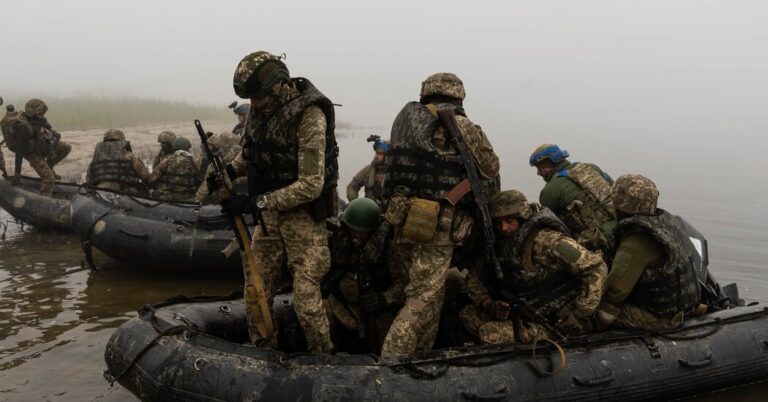For months, Ukrainian forces have been carrying out stealth raids into Russian-held territory on the eastern bank of the Dnipro River near the southern city of Kherson, Ukraine. The operations have been shrouded in secrecy, with small groups of Ukrainian soldiers crossing the river at night to avoid Russian drones, and officials remaining tight-lipped about the fierce fighting.
On Friday, Ukrainian officials broke their silence and said that their forces had seized a sliver of land on the Russian-controlled bank, a claim that was supported by geolocated footage of troop positions along the front line.
“We managed to gain a foothold on several bridgeheads,” the Ukrainian Marine Corps said on Facebook, using a military term for a secured position on the enemy side of a river. The Ukrainian military’s general staff reported “a series of successful operations” on the left bank of the Dnipro, and President Volodymyr Zelensky posted a short message with photos showing Ukrainian soldiers operating small boats on a waterway.
“Left bank of Kherson region,” Mr. Zelensky said. “Our warriors.”
Military analysts said the announcements were likely intended to offer a glimmer of hope for Ukraine and its Western allies after weeks of sobering developments like a stalled counteroffensive and uncertainty over continued U.S. military aid.
But they added that such small territorial gains were unlikely to translate into rapid breakthroughs. Instead, experts expect Ukrainian forces to focus on securing their positions in the area, possibly aiming to use them as a springboard for a future counteroffensive.
“Their current capacities to move forward deeper toward Crimea are simply not there,” Konrad Muzyka, a military analyst for Rochan Consulting in Poland, said in an interview, referring to the southern Ukrainian peninsula that Moscow illegally annexed in 2014.
A long-term goal, said Mr. Muzyka, who recently returned from a research trip on Ukraine’s battlefield, “could be for these forces to maintain the bridgeheads over the winter, expanding them where possible,” while Ukraine’s military leaders consider options for a new southern offensive next year.
The cross-river attacks began this summer, when Ukrainian troops started harassing Russian forces in night raids, using small boats to drop off soldiers at various points along the meandering river. A marine sergeant, who asked not to be identified because he was not authorized to speak to the press for security reasons, described a frantic and bloody fight with such intense shelling on the left bank that units battling there rotated every three days.
Military analysts initially viewed the raids as an attempt to tie down Russian troops in the area and prevent them from being moved to other parts of the front where Russia was on the offensive, such as in the east.
After weeks of fighting, geolocated footage showing an expanded Ukrainian foothold, along with reports by Russian military bloggers that Ukraine had moved some armored vehicles into the area, suggested a more ambitious operation.
Vladimir Saldo, the Russian-installed governor of the occupied part of the Kherson region, acknowledged in a statement on Wednesday that “small groups” of Ukrainian soldiers were operating in an area from a Dnipro railway bridge to the village of Krynky, a distance of about 12 miles. Ukrainian soldiers involved in the operations said it had taken long hours of wading through mud just to reach the village.
Mr. Muzyka, the military analyst, said that despite the grueling fighting, Ukraine had continued its Dnipro assaults to show its allies that it could still achieve some success and “give the West reasons to sustain military support for Ukraine.” Some Republican lawmakers in Washington are questioning the merits of doing so in the face of slow progress on the battlefield.
The Ukrainian military’s general staff also said that the attacks had aimed to “push the enemy as far away” as possible from the river’s Ukrainian-held right bank to protect civilians in Kherson, which Russian forces have been shelling relentlessly.
A Russian-appointed official in southern Ukraine, Vladimir Rogov, suggested on Russian television last week that Ukrainian forces had cut off a road connecting several towns in the area, making it “necessary to take a detour and make a fairly large circle to deliver ammunition and personnel.”
On Monday, Russian state news agencies published reports that Moscow was moving its troops on the left bank to “more favorable positions.” The reports were retracted moments later, after the Ministry of Defense called them false and said they represented a “provocation.”
Still, Mr. Muzyka said that “given how small these bridgeheads currently are, the likelihood of Ukrainians significantly impacting Russian lines of communications or logistical lines is incredibly small” at the moment.
Valeriy Prozapas, a Ukrainian army captain, suggested as much on Ukrainian television on Friday, saying that “it is too early to say that strategic breakthrough actions are taking place.”

